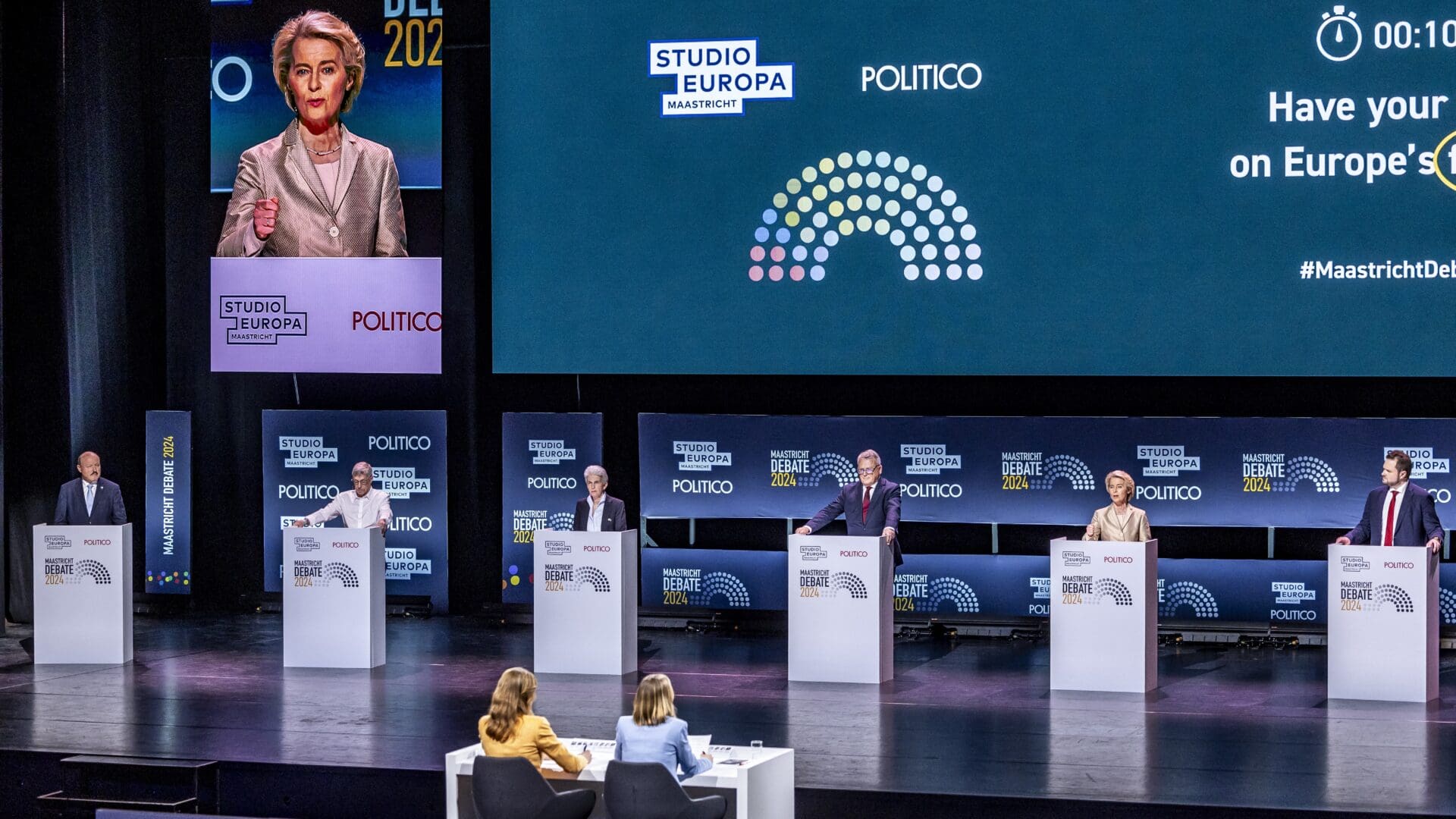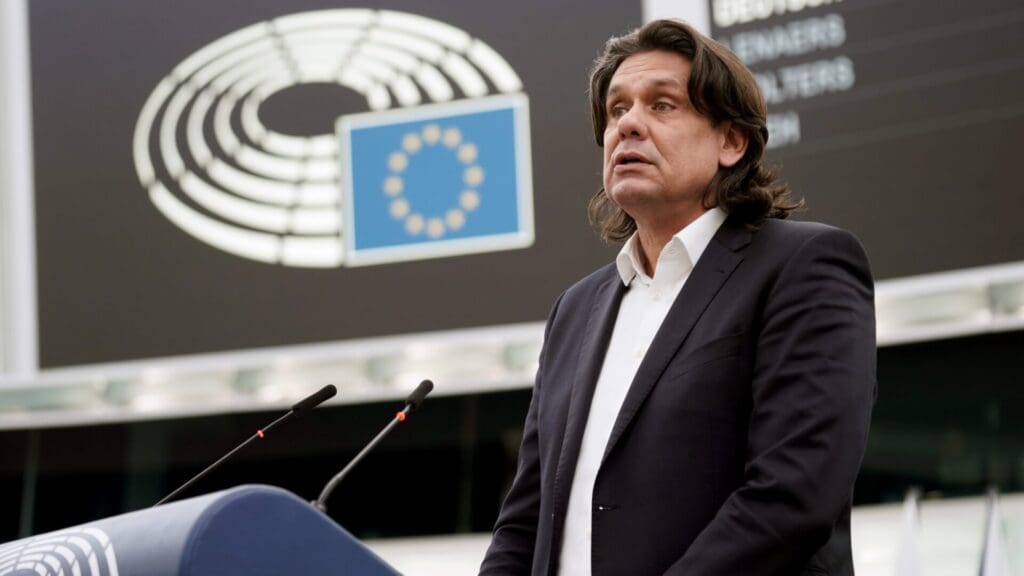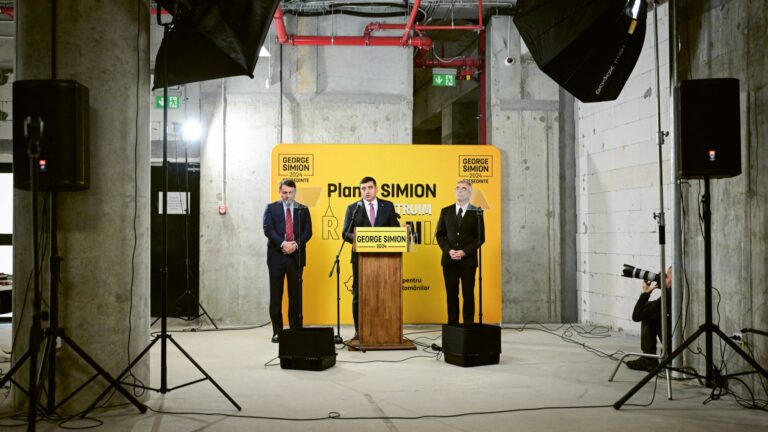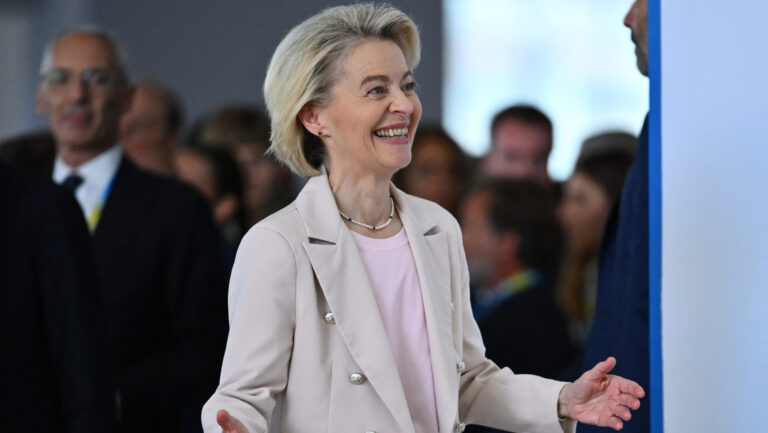Nothing shows the strength of the real European right more than the fact that Ursula von der Leyen, breaking with past practice, would cooperate with the European Conservatives and Reformists (ECR) political group in the new European Parliament after the June elections. This significant announcement was made during the Maastricht Debate hosted by POLITICO Brussels where lead candidates from various European political groups presented their visions for the upcoming five-year term. Predictably, this move sparked considerable backlash from her current allies, primarily the Socialists (S&D) and the Greens.
A collaboration with the ECR ‘depends very much on how the composition of the Parliament is, and who is in what group,’ von der Leyen told the audience of 900 people gathered at the Vrijthof theatre for the Monday night debate, with more than 250,000 watching online.
Von der Leyen has previously indicated her willingness to cooperate with certain ECR parties, stipulating that they must align with pro-NATO, pro-EU, pro-Ukraine, and pro-rule-of-law principles. However, her recent statement holds greater significance for several reasons. Firstly, the Maastricht Debate stands as one of the paramount platforms for the European elections,
with statements made here carrying substantial weight throughout the campaign.
As we approach the crucial elections with just over a month remaining, the inclusion of cooperation with the ECR in von der Leyen’s campaign signals her readiness for partnership and signifies a notable surge in the political group’s influence.
The ECR, alongside the right-wing Identity and Democracy (ID), is poised to make significant gains in seats in the upcoming European Parliament elections. Presently, the ECR boasts 68 MEPs, a figure projected to increase to at least 75 following the June elections, according to POLITICO‘s Poll of Polls. Similarly, ID is expected to see a rise in its representation, with the ability to send 83 MEPs to the new EP compared to its current 59. In contrast, the liberal-centrist Renew party may experience a decline in seats from 102 to 87, while the Greens’ representation could drop from 72 to 46. Notably, the two largest political groups in the EP, the European People’s Party (EPP) and S&D, are unlikely to see significant changes in their seat counts, with only a minimal decrease projected.
It’s evident that the European right has significantly strengthened in recent years, a fact not lost on Ursula von der Leyen, who is vying for her second Commission presidency. However, the extent and areas in which von der Leyen—and her party, the EPP—can cooperate with ECR remain to be seen. The ECR comprises parties that have, in one way or another, clashed with the Commission President. Consider the Polish Law and Justice (PiS) party, led by former Polish Prime Minister Mateusz Morawiecki, which has been embroiled in conflicts with Brussels, akin to those of Hungary, over EU funds frozen due to rule of law concerns.
Furthermore, press reports and certain political statements suggest that Hungarian Prime Minister Viktor Orbán’s party, Fidesz, may potentially join the ECR after the elections. Balázs Orbán, the prime minister’s political director, indicated to Euractiv last week that Fidesz has numerous options to consider,
The two leading parties within the ECR, namely the Brothers of Italy (Fratelli d’Italia; FdI) led by Italian Prime Minister Giorgia Meloni, and the Polish Law and Justice (PiS) maintain favourable relations with Fidesz. From this perspective, it would be a logical decision for the Hungarian government party to align with the ECR. Speaking to Euractiv, Morawiecki stated: ‘I can tell you that I have a very good feeling with my colleagues from Fidesz, I know that Giorgia Meloni and Viktor Orbán have a good relationship.’
Fidesz parted ways with EPP in 2021, and tensions between the political group and the Hungarian governing party have persisted. EPP leader Manfred Weber has maintained criticism of the Hungarian government, frequently accusing Viktor Orbán of being pro-Putin. Naturally, Fidesz’s relationship with Ursula von der Leyen is also fraught with challenges, casting doubt on the feasibility of cooperation if the Hungarian government party does indeed align with the ECR.
Von der Leyen’s current allies have certainly not remained silent regarding the commission president’s statement. Nicolas Schmit, the top candidate for the S&D, expressed a firm stance, stating: ‘Values and rights cannot be divided according to some political arrangements. Either you can deal with the extreme right because you need them, or you say clearly there is no deal possible because they do not respect the fundamental rights our Commission has fought for.’ Speaking to journalists following the debate, Schmit reiterated that the Socialists are unwilling to endorse any programmes associated with the ECR.
A similar sentiment was echoed by Bas Eickhout, top candidate of the Greens. ‘We Greens exclude them (the ECR – ed.) and I think this election will then be about this choice.’
However, to secure another term as commission president, von der Leyen will likely require the support of either the Socialists, the Greens, or Renew. With the European Parliament expanding to 720 MEPs from the current 705, the president will be elected by a majority vote, necessitating at least 361 MEPs to vote in favour of Ursula von der Leyen. The EPP is expected to secure 175 seats, which, when combined with the estimated seats of the ECR, amounts only to 250 votes.
Read more on the upcoming European Parliament elections:








